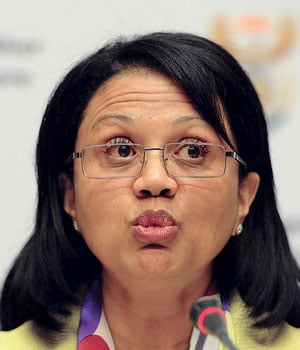
The South African government has dusted off an agreement that is more than 20 years old in an attempt to show it has not signed an unconstitutional agreement with Russia for new nuclear power stations.
This is one of the allegations made this week by Earthlife Africa and the Southern African Faith Communities’ Environment Institute in a court application that could possibly thwart the government’s ambitious nuclear plans in the short term.
The two civil society organisations are asking the Western Cape High Court to declare Energy Minister Tina Joemat-Pettersson’s decision to sign an intergovernmental agreement with Russia for the building of new nuclear power stations unconstitutional.
According to the two organisations’ affidavit, the government decided illegally, in September 2014, to sign an agreement with Russia for the construction of South Africa’s new nuclear power stations, without there having been a tender for it.
The other agreements, signed with several countries including the US, South Korea, China and France, were, according to the statement, just “window dressing”; an attempt to make it look as if a genuine procurement process had taken place.
One of the agreements Joemat-Pettersson finally tabled in Parliament – the intergovernmental agreement with the US – was signed in Pretoria on August 25 1995. It is, therefore, older than the 2010 integrated energy plan required for the construction of new nuclear power stations.
Makoma Lekalakala, branch coordinator of Earthlife Africa, said the contents of the agreement signed with Russia differs in a “significant and substantial way from the provisions of the other intergovernmental agreements”.
“It records binding undertakings in relation to the procurement of new nuclear generation capacity and South Africa’s liability consequent on such procurement, prior to any constitutionally and statutorily compliant procurement process having been undertaken.”
Lekalakala pointed out that Rosatom, the Russian nuclear power corporation, issued a press release in September 2014 in which they went public to claim they had “signed a deal for the construction of nuclear power plants in South Africa”.
According to Lekalakala’s statement, that understanding was “clearly warranted, on a plain reading of the agreement”.
“It is telling that the government then immediately sought to downplay the significance of the agreement and sought at first to keep the agreement secret, given that it would evidently be unlawful to enter into such an agreement without a lawful procurement process.”
All the agreements were finally tabled in Parliament in June.
But according to Lekalakala, the real purpose of the other agreements is “little more than window dressing”.
“Government did not even go through the pretence of entering into any new broad cooperation agreements with the US and South Korea. It simply sought to dust off prior agreements that had previously been approved or tabled before Parliament, for presentation alongside the Russian intergovernmental agreement.”
The agreement with South Korea was signed on October 8 2010. Further agreements with Canada and Japan were planned.
Lekalakala says there are several differences between the intergovernmental agreement signed between South Africa and Russia, and those signed between South Africa and other countries. The Russian pact makes it clear that a different sort of relationship was planned.
She said one of the clauses of the Russian agreement specified that the parties would work together on projects related to the construction of two nuclear power stations with VVER reactors. VVER refers to a type of technology that is manufactured by Russia.
“I note that none of the other intergovernmental agreements includes this type of specificity and such firm commitments: it makes it clear that there is an agreement to construct particular types of reactors (only manufactured by Russia), particular numbers, and provides an initial location thereof.”
In terms of section 217 of the constitution, the government is obliged to have a system that “is fair, equitable, transparent, competitive and cost-effective” to use when contracting for goods or services




 Publications
Publications
 Partners
Partners








